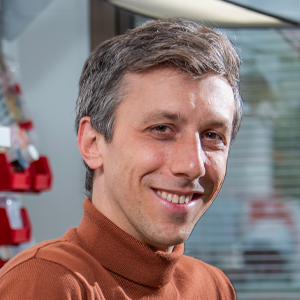Adrien Peyrache is associate professor of neurology and neurosurgery at McGill University’s Montreal Neurological Institute, joining the institution in 2016. He holds the Canadian Research Chair in Systems Neuroscience and has significantly contributed to understanding memory and spatial navigation, particularly regarding the coordination of neurons during sleep to support memory formation.
As an active proponent of open science, Peyrache co-founded—and, until 2022, chaired—the selection committee of The Neuro – Irv and Helga Cooper Foundation Open Science Prize. He serves on the reviewing editorial board of eLife, and in 2024 he co-founded the Quebec Sleep Research Network, where he is co-director.
Peyrache completed his undergraduate studies at ESPCI-Paris Sciences et Lettres University and obtained a master’s degree in cognitive science at Ecole Normale Supérieure, followed by a Ph.D. in neuroscience at the College de France. For his postdoctoral training, he first worked with Alain Destexhe at the CNRS and then joined the lab of Gyorgy Buzsaki at New York University.



